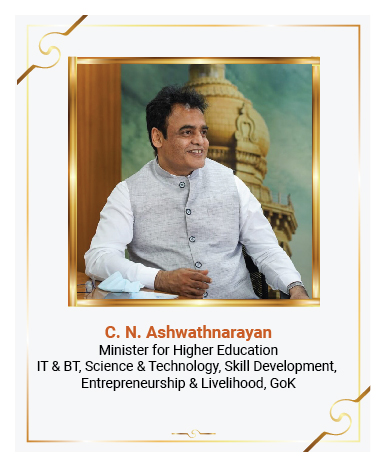C. N. Ashwathnarayan Minister for Higher Education; IT & BT, Science & Technology; Skill Development, Entrepreneurship & Livelihood, GoK

F or instance, industry leaders spell out areas for improvement in students graduating, or their expectations and requirements. At the same time, HEIs can request industry involvement at the graduate and post-graduate level. The government can then take measures and formulate policies for skill development and apprise HEIs to address these gaps and support them in the process. Karnataka was chosen to implement the NEP pilot project. That speaks volumes about how Karnataka Education Department and the Karnataka HEIs are gauged in terms of their capabilities and strengths and adaptability. After 34 years the honorable prime minister rolled out NEP to address the new age requirements. This policy is transformative and forward looking even as it addresses the lacuna of the current education system.
I must say, that the HEIs are doing a commendable job, going the extra mile, in transitioning towards NEP implementation as well as adapting to the blended education model. Although tremendous effort is required by all stakeholders -- management, faculty members and students, Karnataka HIEs, I am sure will provide a model for other states of the country to follow and emulate.
What challenges are institutions facing in implementing NEP?To implement NEP, the scale and depth of transformation required is massive. As in any change of this stature, there are bound to be apprehensions, resistance and initial hiccups. Added to this is the pandemic disruptions that we were already facing. As we are well aware the education sector faced an unprecedented challenge. However, technology has helped us. And the entire education ecosystem pitched in, in a big way to provide, seamless and unhindered teaching and learning.
Challenges per se are about how NEP should be taken forward, the process of translating what is written on paper at ground zero. A lot of effort and time is being spent by the education department and the HEIs to make NEP a reality.
Over the past year and a half GoK, Higher Education Council, universities and institutions have been proactive in training the teachers so they are apprised of the mechanism and structure of NEP and the methodology to implement. I must say the process of implementation has picked up pace and all stakeholders are doing all that is necessary.

